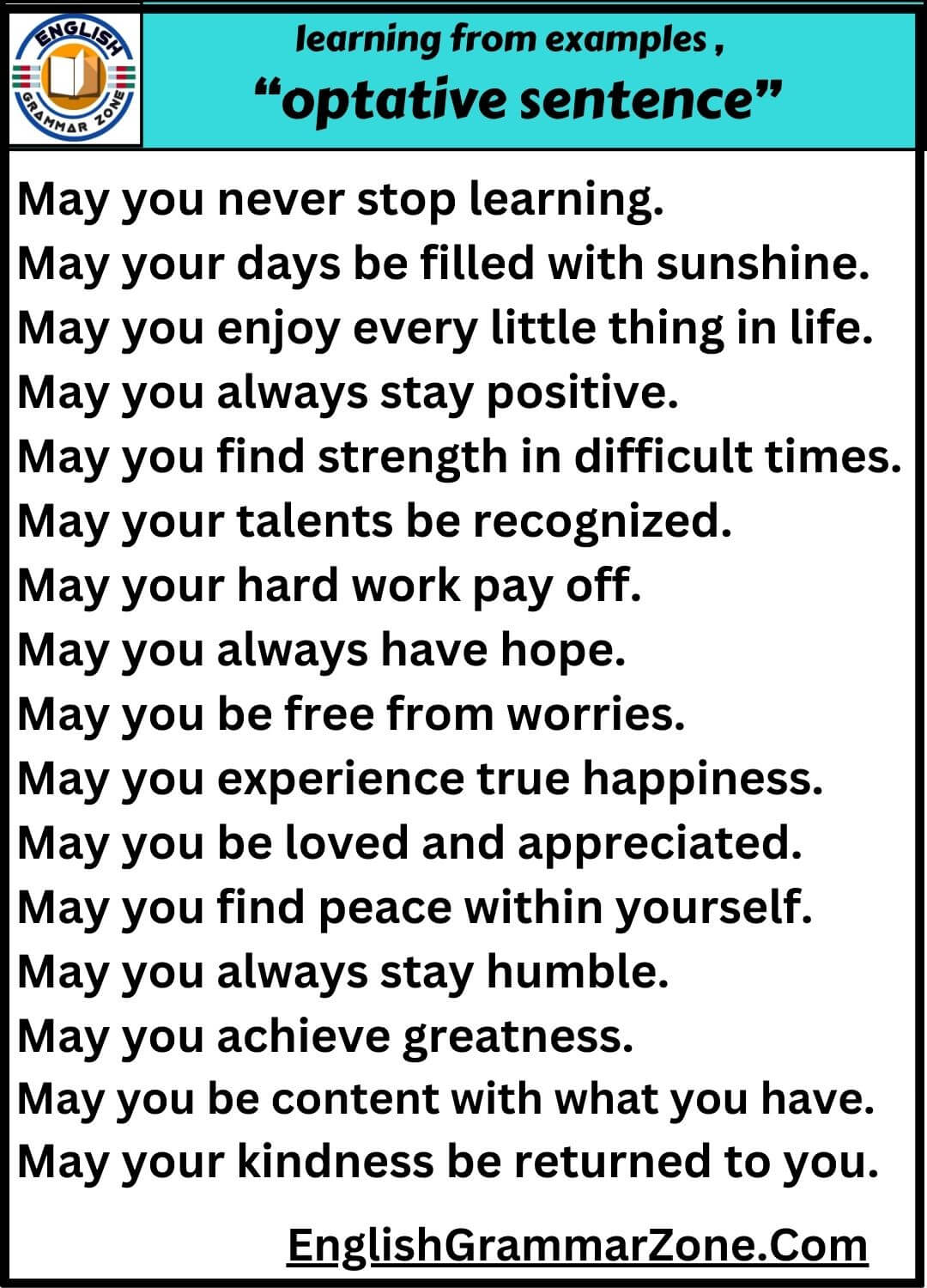Optative sentences are an essential part of English grammar, as they express wishes, desires, or hopes. These sentences often begin with words like “I wish,” “If only,” or “May,” and can convey both positive and negative emotions. Learning useful optative sentences can significantly enhance your communication skills, allowing you to express what you wish for or hope to happen. In this article, we will explore some useful optative sentences, how they are formed, and their practical usage in daily conversations. Whether you’re aiming to sound more fluent or just improve your grammar, knowing these optative sentences will add depth and clarity to your speech.
Optative Sentence Example
- May you have a wonderful day!
- May all your dreams come true.
- May you succeed in all your endeavors.
- May peace and happiness follow you everywhere.
- May you find joy in every moment.
- May you always have good health.
- May your journey be safe and pleasant.
- May you achieve all your goals.
- May your heart be filled with love.
- May you be blessed with prosperity.
- May your troubles be few and far between.
- May you find what you are looking for.
- May you always have a reason to smile.
- May your future be bright.
- May you be surrounded by loved ones.
- May you never stop learning.
- May your days be filled with sunshine.
- May you enjoy every little thing in life.
- May you always stay positive.
- May you find strength in difficult times.
- May your talents be recognized.
- May your hard work pay off.
- May you always have hope.
- May you be free from worries.
- May you experience true happiness.
- May you be loved and appreciated.
- May you find peace within yourself.
- May you always stay humble.
- May you achieve greatness.
- May you be content with what you have.
- May your kindness be returned to you.
- May you inspire others.
- May you enjoy good fortune.
- May you have a peaceful mind.
- May you find comfort in difficult times.
- May you be surrounded by beauty.
- May your heart always be light.
- May you laugh often.
- May you cherish every moment.
- May you always be courageous.
- May your life be full of adventures.
- May you make wonderful memories.
- May you grow wiser every day.
- May you always be happy.
- May your spirit stay young.
- May you live with purpose.
- May you find love wherever you go.
- May your dreams guide you.
- May you stay true to yourself.
- May you always have peace in your heart.


Frequently Asked Questions (FAQs)
What are Optative Sentences?
Optative sentences are sentences that express wishes, desires, or hopes. They are used when the speaker wants something to happen in the present, future, or even in an imaginary situation. These sentences often start with expressions like “I wish,” “If only,” “May,” or “Would that.” For example:
- “I wish I could go on vacation.”
- “May you have a happy and prosperous year!”
These sentences don’t provide factual information, but instead reflect the speaker’s feelings or desires.
How Do You Form Optative Sentences?
To form an optative sentence, you typically use specific words that indicate desire or wish. Here’s a breakdown of common structures:
- Wishing for a present or future situation:
- “I wish + subject + past tense verb.” Example: “I wish I were taller.”
- Wishing for an impossible or unreal past event:
- “If only + subject + past perfect verb.” Example: “If only I had studied harder.”
- Expressing a desire for others using ‘May’:
- “May + subject + verb.” Example: “May you achieve all your goals.”
- Expressing a desire for yourself or others using ‘Would’:
- “Would that + subject + verb.” Example: “Would that I could see you again.”
Can Optative Sentences Be Used in Everyday Conversations?
Yes, optative sentences can certainly be used in everyday conversations. They are often used to express wishes about situations or events. For example, you might say:
- “I wish you a happy birthday!”
- “May all your dreams come true!”
These sentences help you to convey not only wishes but also your emotional state or desires in a conversation. Using optative sentences naturally in conversations can make your speech sound more thoughtful and expressive.
Are Optative Sentences Only Used in Formal Writing?
No, optative sentences are not limited to formal writing. They are commonly used in casual conversations as well. Whether you’re talking to a friend, family member, or colleague, optative sentences can help you communicate your wishes, hopes, and desires clearly. They add a personal touch to your speech, making it more engaging and heartfelt.
How Do I Improve My Use of Optative Sentences?
To improve your use of optative sentences, practice is key. Here are a few tips to help you:
- Read books, stories, and articles: Notice how optative sentences are used in various contexts.
- Listen to native speakers: Pay attention to how they express wishes or desires in conversations or media.
- Write your own optative sentences: Try expressing wishes or desires about your life or the world around you. For example, “I wish for peace in the world” or “May I travel the world someday.”
By actively practicing these sentences, you’ll be able to use them more naturally and effectively in your communication.
Conclusion:
Optative sentences are a powerful tool in the English language for expressing wishes, desires, and hopes. Whether you want to talk about your dreams or convey your emotions, using these sentences will help you sound more expressive and engaging. By understanding their structure and using them regularly, you’ll enhance your ability to communicate in various situations. Start incorporating useful optative sentences into your daily speech, and soon you’ll be able to express yourself more fluently and confidently.

